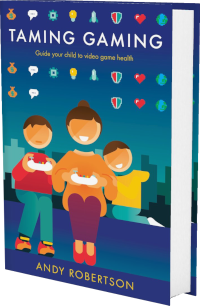 Android
Android iOS
iOS Mac
Mac Switch
Switch Wii
Wii Wii U
Wii U PC
PC PS4
PS4 PS5
PS5 Xbox One
Xbox One Xbox X|S
Xbox X|S29/10/2021 2 years ago Author: Andrew Kinch
If video games are considered a form of entertainment for children that they will grow out of, the idea that parents need to play games themselves to understand the hobby is absurd. However, if video games are a new form of media, like books, films and music, understanding it first hand is a powerful way for parents and guardians to know how to guide their children.
Andrew Kinch, who runs Game Aware, helping gamers and their families find a healthier relationship with gaming, expands on this idea for us...
This isn’t about pointing the finger at mums and dads, or giving them yet another thing to do or feel guilty about. It’s advice that stems from the importance of being present in the world our children are growing up in. Even dipping your toe in the world of video games for 30 minutes can transform not only what you think of video games, but what you think of your child’s love of the pastime.
There are at least 4 valuable outcomes parents will see by walking a mile in the shoes of their kids.
1. Understanding the needs that they are trying to meet in game may share insight into what needs they aren’t able to meet in real life.
2. Understanding the on-screen information in the games being played means you have a sense of the flow of the game and when it’s a better time to interrupt... or know if they started a new game when they shouldn’t have.
3. Acknowledging the value of a healthy gaming hobby will drastically improve any conflict around this topic by letting kids feel that their interests are valued.
4. Understanding the games they play will help you to have discussions about the game mechanics and whether they are engagement or compulsion driven.
When considering playing games yourself, this isn’t about suggesting that adults should play Fortnite, Minecraft or FIFA. While those games may well be enjoyable for a time, they are largely focused on delivering an experience to young and teenage audiences. The idea of parents and guardians playing games themselves aims to put games in their hands that are enjoyable and potentially focusing on topics important to adults, and are easy enough to play even if you’ve never touched a controller in your life.
The challenge, of course, is discovering these mythical games I’m speaking of. Are there really games that grown men and women want to play? People with busy lives, commitments and amazing shows on Netflix. My experience is that if you find the right game for someone and they often choose to spend time playing it rather than other ways of relaxing.
I like the Taming Gaming book because it takes parents on a journey into video games, while not dodging worries of violence, addiction, gambling, online harms and data protection. The second half of the book presents games for parents to play in the form of video game recipes.
The Family Video Game Database extends this by offering a way to search for games by unusual themes, what technology they need and how long they need to play to finish it. Knowledge is power. Having a tool like the family video game database will help you manage expectations about the games your child plays and help you keep on top of it.
On the database are lists of games designed to be a good place for parents to start:
Of course, along with playing games yourself you can find games to play with your family:
© 2024 Family Gaming Database












